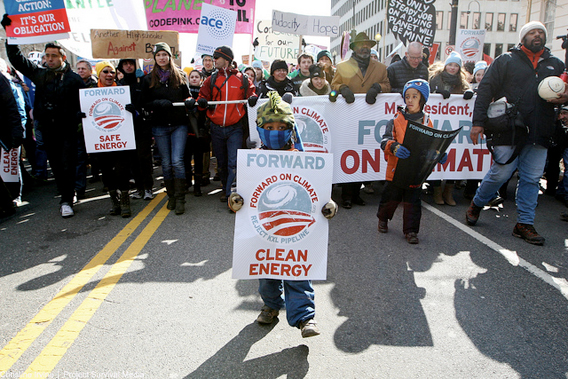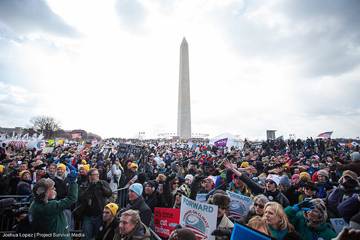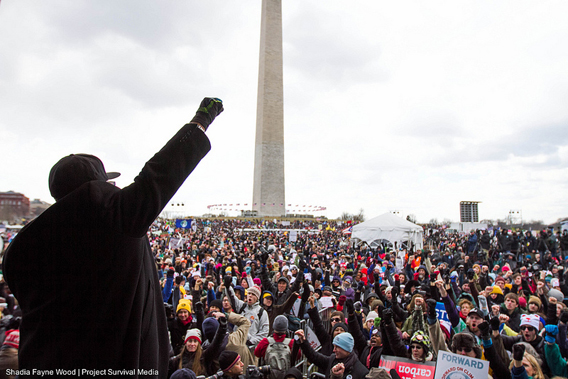
Forward on Climate Rally in Washington DC. Photo by: Project Survival Media.
Yesterday over 35,000 people rallied in Washington D.C. for urgent action on climate change, which, according to organizers, was the largest climate march in U.S. history. Activists called on the Obama Administration to do much more to tackle climate change, including rejecting the Keystone XL Pipeline, which would bring carbon-heavy tar sands oil from Canada through the U.S. to a world market.
“For 25 years our government has basically ignored the climate crisis: now people in large numbers are finally demanding they get to work. We shouldn’t have to be here—science should have decided our course long ago. But it takes a movement to stand up to all that money,” said Bill McKibben, founder of the climate activist group 350.org, at the rally. McKibben called the tar sands in Alberta, Canada, “one of the largest carbon bombs in history.”
There is considerable debate about how much higher carbon emissions are from tar sands oil, but no one doubts that they are larger. Cambridge Energy Research Associates (CERA) estimated the greenhouse gas emissions of the tar sands was 5-15 percent higher than conventional sources, while the International Energy Agency (IEA) found that emissions were 20 percent higher. However, recent research has shown that the destruction of boreal forest and peatlands adds considerable more carbon emissions to the controversial fuel source. In fact, one study estimated that if the entirety of the tar sands were exploited it would raise global temperatures 0.64 degrees Fahrenheit (0.36 degrees Celsius), representing about 45 percent of how much the world has already warmed since the Industrial Revolution.

Groups estimated that the crowd ranged from 35,000 to 50,000. Photo by: Joshua Lopez/Project Survival Media. |
The rally took place less than a week after U.S. President, Barack Obama, noted in his State of the Union speech that, “For the sake of our children and our future, we must do more to combat climate change.”
Since winning re-election last November, Obama has become increasingly outspoken on the need to tackle climate change, including connecting the warming planet to recent disasters, such as drought in the Southwest and Hurricane Sandy last fall. Still, no one knows what the Obama Administration will decide on the Keystone Pipeline. Proponents of the pipeline, which include 52 U.S. Senators, say it will add jobs (though most will be temporary) and bring oil from a friendly neighbor instead of the Middle East.
But the exploitation of the tar sands has done even more than raise global carbon emissions. It is also responsible for significant pollution in Canada, spreading carcinogenic pollution in the Athabasca River and allegedly spiking cancer rates among locals. It has also been blamed for forest destruction and wildlife declines.
“We see the threat of taking tar sands out of the Earth and bringing it through our territories and over our rivers,” Chief Jacqueline Thomas, former Chief of the Saik’uz First Nation in British Columbia and co-founder Yinka Dene Alliance (“People of the Earth”). “The harm being done to people in the tar sands region can no longer be Canada’s dirty secret. We don’t have the billions of dollars that industry has. But we do have our faith that people will do the right thing to protect Mother Earth.”
Activists also called on the Obama Administration to implement new rules through the Environmental Protection Agency (EPA) regulating carbon emission on existing power plants in the U.S.
“This President has the power to achieve the single biggest carbon reduction ever, by holding our biggest carbon polluters—dirty power plants—accountable for what they dump into the air,” said Van Jones, President of Rebuild the Dream and former Obama advisor. “Cleaning up this pollution and using more clean energy will provide jobs to thousands of Americans, save families real money when it comes to electricity bills and, most important, will make a real difference in our health and the health of our children.”
The exploitation of the tar sands has also been blamed for what is widely seen as Canada’s transition from a leader on climate change to an obstructor at international negotiations, including abandoning the Kyoto Protocol. Some have even gone so far as to call Canada a new “petrol state,” which has muzzled scientists, shuttered research, and labeled environmentalists, “foreign radicals.”

Forward on Climate Rally in Washington DC. Photo by: Shadia Fayne Wood/Project Survival Media.

All ages joined in the rally. Photo by: Christine Irvine/Project Survival Media.

All ages joined in the rally. Photo by: Christine Irvine/Project Survival Media.
Related articles
Obama connects climate science and policy in State of the Union
(02/13/2013) After several years of silence on climate change, U.S. President Barack Obama has begun speaking out following his re-election last November. The President surprised many by giving climate change a central role in his inauguration speech last month, and he followed-up in his State of the Union speech last night when he called on congress to “pursue a bipartisan, market-based solution to climate change,” but added that the administration would take action itself if congress failed.
Head of IMF: climate change is ‘the greatest economic challenge of the 21st century’
(02/06/2013) Climate change not debt or austerity is “the greatest economic challenge of the 21st Century,” according to Christine Lagarde, the head of the International Monetary Fund (IMF). Speaking at the World Economic Forum in Davos, Switzerland, Lagarde painted a stark picture of the challenges the world faces when up against rising temperatures.
Climate change melting glaciers in the Andes
(01/22/2013) Glaciers are melting faster than ever in the tropical Andes, warns a new study published in The Cryosphere, which puts the blame for vanishing glaciers squarely on climate change. The study — the most comprehensive to date — found that since the 1970s glacier melt in the region has been speeding up, threatening freshwater supplies in Peru and Bolivia.
Obama: ‘We will respond to the threat of climate change’
(01/21/2013) In Obama’s second inauguration speech today, the newly re-elected president of the U.S. reaffirmed his commitment to taking action on climate during his second term. Noting that ignoring climate change would “betray our children and future generations,” Obama argued whole-heartedly for a transition to clean energy.
NASA says 2012 was the 9th warmest year since 1880, blames global warming
(01/15/2013) 2012 was the ninth warmest year since annual record-keeping began in 1880 say NASA scientists who cited rising greenhouse gas emissions as the chief culprit.
Soot is second biggest man-made contributor to global warming
(01/15/2013) Soot is the second largest man-made contributor to global warming, according to a comprehensive new study published in the Journal of Geophysical Research: Atmospheres.
Climate change already pummeling U.S. according to government report
(01/14/2013) Climate change is on the march across the U.S. according to a new draft report written by U.S. government scientists with input from 240 experts. It documents increasing and worsening extreme weather, rising sea levels, and ocean acidification among other impacts. Released Friday for public review, the report will be officially launched later this year or early in 2014.

(01/10/2013) Global strategist, trained educator, and international lecturer Daniel Rirdan set out to create a plan addressing the future of our planet. His book The Blueprint: Averting Global Collapse, published this year, does just that. “It has been a sixty hour a week routine,” Rirdan told mongabay.com in a recent interview. “Basically, I would wake up with the burden of the world on my shoulders and go to sleep with it. It went on like this for eighteen months.” It becomes apparent when reading The Blueprint that it was indeed a monumental undertaking.
Australia reels from record heatwave, fires
(01/09/2013) Yesterday Australia recorded its highest average temperature yet: 40.33 degrees Celsius (104.59 Fahrenheit). The nation has been sweltering under an unprecedented summer heatwave that has spawned wildfires across the nation, including on the island of Tasmania where over 100 houses were engulfed over the weekend. Temperatures are finally falling slightly today, providing a short reprieve before they are expected to rise again this weekend.
2012 was America’s warmest year on record
(01/08/2013) 2012 was the warmest year on record for the contiguous U.S. according to the National Oceanic and Atmospheric Administration (NOAA).














